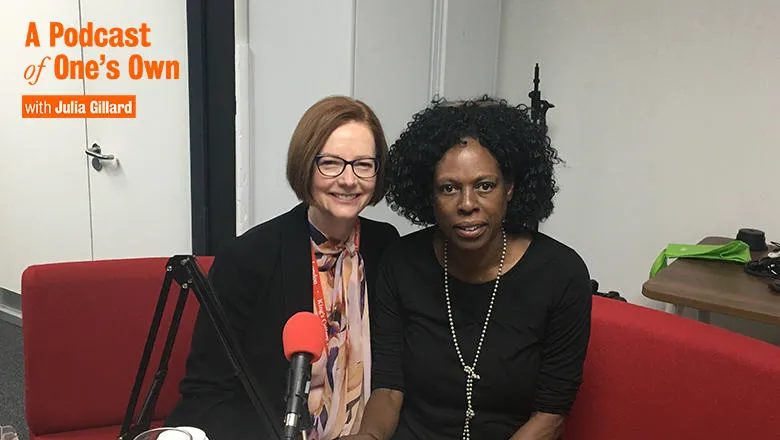25 October 2019
“What happened at Grenfell told me everything that was wrong with the society we lived in” – campaigner Yvette Williams on fighting for justice
In the latest podcast episode Julia talks to Yvette Williams about campaigning on justice for Grenfell.

In the latest episode of A Podcast of One’s Own with Julia Gillard, coordinator and co-founder of Justice4Grenfell, Yvette Williams, talks about her experience leading the response to the tragic 2017 Grenfell Tower fire in London which claimed the lives of 72 people.
Released today, the episode comes just before the publication of the first phase of the Grenfell Tower Inquiry on 30 October.
Williams, who co-founded the campaign to hold the authorities to account, wasn’t a resident at the tower herself, but lived in the neighbourhood and witnessed the blaze:
“Within 15 minutes of us being there, you just heard this almighty explosion and that’s when you could see the fire going up, up, up and there’s almost like a moment of silence and then screaming...I could see people at the windows, and lots of people shouting for them to get out.”
Despite the scale of the emergency and hopelessness of neighbourhood residents, she recalls the lack of support given to the community:
“There was no presence of authority there…nothing was happening, we were just there, the community talking amongst each other…just trying to work our way through.”
And even in the aftermath of the tragedy, Williams describes how, when the community continued to be let down by the borough, they had to take things into their own hands:
“The community relief centres set up as they can, and people do what they can do - ‘if you can cook, cook, if you can pack clothes, pack clothes, if you can help people, help people, talk to people, comfort people’…as a community we just literally got on with it.”
Several days later when the then Prime Minister, Theresa May, announced the inquiry into the fire, Williams, who had previously campaigned for justice for the murder of teenager Stephen Lawrence, knew that the community had to hold the authorities to account:
“My hackles go up, because I know the lessons from Lawrence and I knew the lessons from Hillsborough who waited nearly 30 years for some kind of justice.”
So she and a friend established Justice4Grenfell, at first delivering frontline services from his basement flat:
“People just kept turning up…in particular bereaved families that were coming in, who didn’t live in the area or didn’t live in the country and were coming in from abroad and there was no kind of document or anything from the authorities…They’d come into the area and people would say ‘Oh go down to Ishmael’s basement they’ll help you’”.
As the campaign gathered momentum, Williams was pushed into the limelight, becoming the public face of the campaign in the UK and international media, she talks about how challenging this was:
“I always hated public speaking…I realise now I probably held myself back with regards to that, I was the blocker… but it was almost that ‘If not you who?’ moment…I knew I had the information there and I just needed to get it out. It was important that Grenfell stayed in the public psyche.”
She also talks about the vital importance of hearing women’s voices from the community in the campaign. In particular, two of the survivors of the fire had previously reported incidents of domestic violence to the police, but unfortunately this was overlooked by the authorities and they were housed in hotel rooms with their husbands.
She also believes that potential victims of female genital mutilation (FGM) were let down, as despite the fact that the issue was high on the government’s agenda at the time, there was no way of telling whether girls who were missing from school were absent due to trauma from the fire or whether they were being taken out of the country for FGM.
“You have an emergency, but everything we’ve worked for in terms of that violence against women agenda that the government has been very supportive of, that falls out.”
While she believes that no justice has yet been found for the victims and their bereaved families, the community has grown stronger as a result of the tragedy:
“We have a great community that’s organising, so claiming back community assets...we have a greater say in our local authority, we are hoping that the issues around social housing, cladding, inflammable cladding on buildings etc is really looked at. And those issues around people being safe in their home are affecting communities up and down the country, so it’s helping us to build alliances.”
You can find this episode and previous episodes of Julia Gillard’s podcast series, A Podcast of One’s Own, on all the main podcast platforms. Previous guests have included comedian Sandi Toksvig, journalist and campaigner Caroline Criado-Perez and businesswoman Helena Morrissey.
